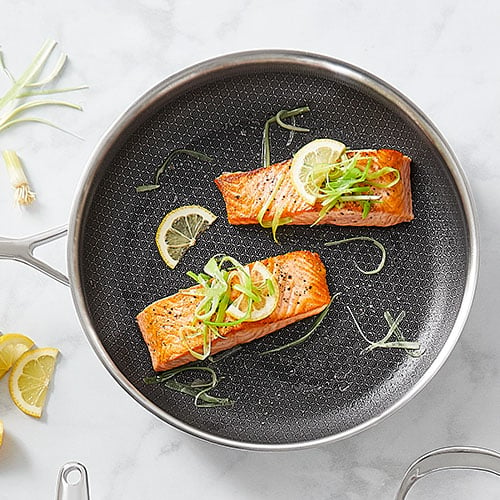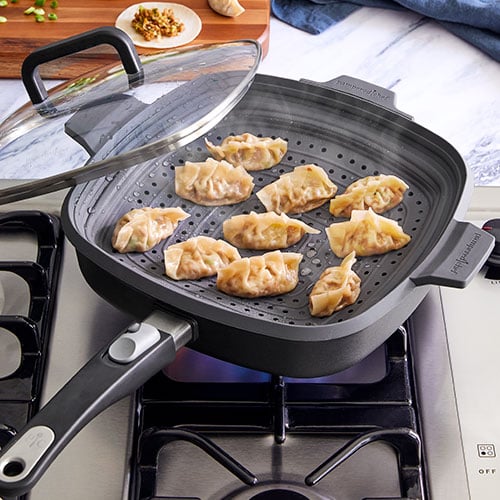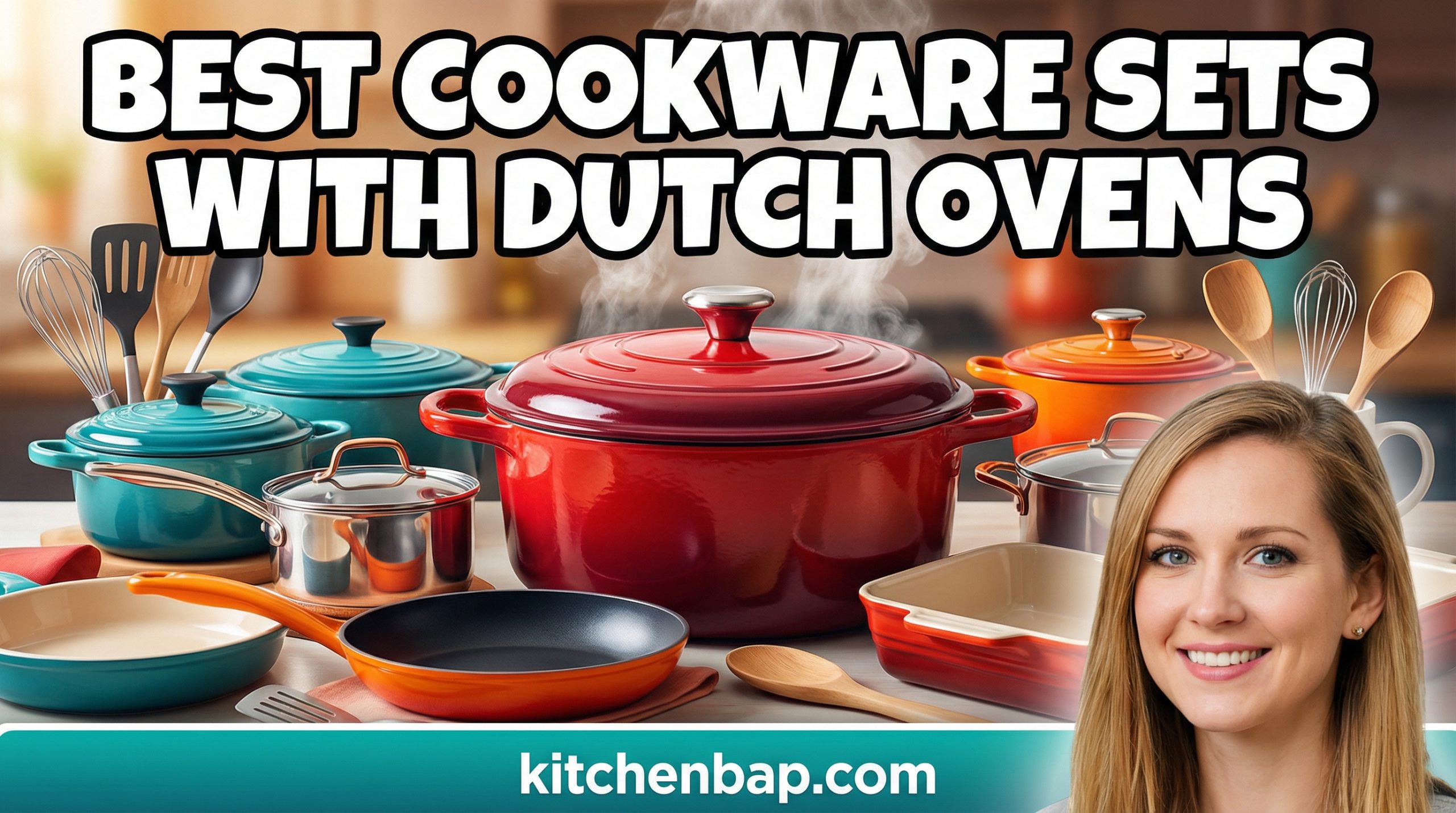Non-stick specialty cookware is essential for delicate dishes. It ensures even cooking and prevents food from sticking.
Non-Stick Specialty Cookware for Delicate Dishes:Non-stick cookware is perfect for preparing delicate dishes like omelets, fish, and pancakes. It allows for lower-fat cooking because it requires less oil or butter. The non-stick surface ensures that food slides off easily, making both cooking and cleaning more convenient.
High-quality non-stick pans distribute heat evenly, reducing the risk of burning or uneven cooking. This type of cookware is also ideal for beginners and seasoned chefs alike, providing reliable performance. Investing in good non-stick cookware can elevate your culinary skills and make preparing delicate dishes a breeze. Durable and easy to use, non-stick pans are a must-have in any kitchen.

Credit: www.pamperedchef.com
Introduction To Non-stick Specialty Cookware
Cooking delicate dishes can be tricky. Using the right cookware makes a difference. Non-stick specialty cookware is a great choice. It helps in making perfect dishes every time. This cookware is designed for delicate cooking needs.
Importance In Cooking
Non-stick cookware is a must-have in the kitchen. It prevents food from sticking to the pan. This is especially important for delicate dishes. These dishes include pancakes, eggs, and fish.
Using non-stick cookware, you use less oil. This makes your meals healthier. It also makes cleaning up easier. You can simply wipe the pan clean. Non-stick cookware also cooks food evenly. This ensures your food is cooked to perfection.
Types Available
There are different types of non-stick specialty cookware. Each type serves a unique purpose. Here is a list of some common types:
- Non-Stick Frying Pans: Great for eggs and pancakes.
- Non-Stick Saucepans: Perfect for making sauces and soups.
- Non-Stick Griddles: Ideal for cooking fish and meats.
- Non-Stick Woks: Best for stir-frying vegetables and meats.
Each type of cookware has its own benefits. Choose the right one for your cooking needs.
| Type | Best For |
|---|---|
| Non-Stick Frying Pans | Eggs, Pancakes |
| Non-Stick Saucepans | Sauces, Soups |
| Non-Stick Griddles | Fish, Meats |
| Non-Stick Woks | Stir-Frying |
Using the right cookware improves your cooking experience. Try different types to find what works best for you.

Credit: www.amazon.com
Choosing The Right Cookware
Selecting the right non-stick specialty cookware is crucial for making delicate dishes. The right cookware ensures your food doesn’t stick and is cooked evenly. Let’s explore key factors to consider.
Material Considerations
The material of your cookware affects cooking results. Non-stick coatings are essential for delicate dishes like pancakes, eggs, and fish. These coatings prevent food from sticking and make cleanup easier.
Aluminum is a popular choice due to its excellent heat conductivity. It heats up quickly and evenly. Ceramic-coated cookware is another great option. It’s free from harmful chemicals and offers a natural non-stick surface.
Stainless steel with a non-stick coating combines durability with ease of use. It’s resistant to scratches and ideal for daily cooking.
Size And Shape
The size and shape of your cookware impact your cooking experience. For delicate dishes, consider small to medium-sized pans. They provide better control and even heating.
Round pans are versatile and suitable for most tasks. Square or rectangular pans offer more surface area, perfect for grilling or roasting.
Here’s a quick reference table for choosing the right size and shape:
| Cookware Type | Ideal Use |
|---|---|
| Small Round Pan | Omelettes, pancakes |
| Medium Round Pan | Fish, sautéing vegetables |
| Square Pan | Grilling, roasting |
| Rectangular Pan | Baking, casseroles |
Choose the right size and shape to match your cooking needs. This ensures better results and a more enjoyable cooking experience.
Benefits Of Non-stick Cookware
Non-stick cookware offers many benefits for cooking delicate dishes. It is designed to make cooking easier, healthier, and more enjoyable. Here, we explore some key advantages of using non-stick cookware.
Ease Of Use
Non-stick cookware is incredibly easy to use. The food does not stick to the pan, making cooking and cleaning simple. You can cook eggs, pancakes, and fish without them breaking apart. This cookware is also lightweight, which makes it easy to handle and move around.
| Feature | Benefit |
|---|---|
| Non-Stick Surface | Food does not stick. |
| Lightweight | Easy to handle. |
| Even Heating | Prevents burning. |
These features make non-stick cookware perfect for everyday use. Anyone can cook with confidence using these pans.
Health Advantages
Non-stick cookware also has health benefits. You can cook with less oil or butter. This reduces the fat and calorie content of your meals. This is great for those who want to eat healthier.
- Less oil needed
- Lower calorie meals
- Reduced fat intake
Using non-stick cookware also helps in retaining nutrients. The even heat distribution ensures food is cooked properly. This means you get the most nutrition from your meals.
These health advantages make non-stick cookware a smart choice for families. Eating healthier meals becomes easier with the right tools.
Cooking Techniques For Delicate Dishes
Non-stick specialty cookware is perfect for delicate dishes. These dishes require specific techniques to ensure success. Understanding these techniques can lead to perfect results every time.
Temperature Control
Temperature control is crucial for delicate dishes. Non-stick cookware heats quickly and evenly. This makes it easy to maintain the right temperature.
Always preheat your pan before adding ingredients. This helps in even cooking. Use medium to low heat settings. High heat can damage non-stick surfaces and ruin delicate dishes.
| Heat Setting | Purpose |
|---|---|
| Low Heat | Simmering and gentle cooking |
| Medium Heat | Sauteing and browning |
Gentle Stirring
Gentle stirring is important for fragile foods. Using the right tools can help. Opt for silicone or wooden utensils. These tools are gentle on non-stick surfaces.
Stir slowly and carefully to avoid breaking the food. Over-stirring can cause delicate ingredients to fall apart. Be patient and let the cookware do its job.
- Use silicone or wooden utensils
- Stir slowly and carefully
- Avoid over-stirring
Mastering these techniques can elevate your cooking. Your delicate dishes will turn out beautifully every time.
Care And Maintenance Tips
Proper care and maintenance of non-stick specialty cookware ensure its longevity and performance. Follow these simple tips to keep your cookware in top shape.
Cleaning Methods
Cleaning non-stick cookware requires gentle methods. Avoid using metal utensils or abrasive cleaners.
- Always let the cookware cool down before washing.
- Use warm, soapy water and a soft sponge.
- For stubborn residue, soak the pan in warm water for a few minutes.
- Dry the cookware completely before storing it.
Storage Suggestions
Proper storage prevents damage to the non-stick surface. Follow these suggestions for safe storage.
- Store pans separately to avoid scratching the surface.
- Use pan protectors or paper towels between stacked pans.
- Hang pots and pans if possible, to keep them from touching.
- Avoid placing heavy items on top of non-stick cookware.
Common Mistakes To Avoid
Non-stick specialty cookware makes cooking delicate dishes easier. Yet, many people make common mistakes that can damage this cookware. Avoid these mistakes to ensure your cookware lasts longer and performs better.
Overheating Issues
Overheating your non-stick cookware can cause serious damage. Non-stick coatings can break down at high temperatures. This not only reduces the non-stick effect but can also release harmful fumes. Always use medium or low heat for cooking.
A good practice is to preheat your pan on low. Then, add your ingredients and increase the heat as needed. This method protects your non-stick surface and ensures even cooking.
Using Metal Utensils
Using metal utensils is another common mistake. Metal can scratch and damage the non-stick coating. These scratches reduce the effectiveness of the non-stick surface over time. Opt for wooden, silicone, or plastic utensils instead.
Here’s a quick reference table for utensil choices:
| Utensil Material | Non-Stick Safe? |
|---|---|
| Metal | No |
| Wooden | Yes |
| Silicone | Yes |
| Plastic | Yes |
Following these guidelines helps maintain the quality and longevity of your non-stick cookware. Treat your cookware with care for the best cooking results.
Recommended Brands And Products
When it comes to cooking delicate dishes, using the right cookware is crucial. Non-stick specialty cookware ensures your delicate foods don’t stick and fall apart. In this section, we will explore recommended brands and products for non-stick specialty cookware. These selections are designed to help you cook delicate dishes with ease.
Top Picks
Here are some of the top picks for non-stick specialty cookware. These brands are well-known for their quality and durability.
| Brand | Product | Key Features |
|---|---|---|
| T-fal | Expert Pro Non-Stick Fry Pan |
|
| Calphalon | Premier Hard-Anodized Nonstick Fry Pan |
|
| All-Clad | HA1 Hard Anodized Nonstick Fry Pan |
|
Budget-friendly Options
Not everyone wants to spend a fortune on cookware. Here are some budget-friendly options that still offer great performance for delicate dishes.
- GreenLife Soft Grip Ceramic Non-Stick Cookware
- Affordable and eco-friendly
- Thermolon ceramic non-stick coating
- Available in various colors
- Cuisinart Chef’s Classic Nonstick Hard-Anodized Cookware
- Highly durable
- Quantanium non-stick coating
- Cool grip handles
- Ozeri Stone Earth Frying Pan
- Stone-derived non-stick coating
- Scratch-resistant
- Comfortable silicone-coated handle

Credit: www.pamperedchef.com
Delicious Recipes To Try
Non-stick specialty cookware is perfect for making delicate dishes. The right cookware can make cooking easier and more enjoyable. Here are some recipes that will help you make the most of your non-stick cookware.
Breakfast Delicacies
Start your day with these delightful breakfast recipes. They are easy to make and delicious to eat.
- Fluffy Pancakes
- Ingredients:
- 1 cup flour
- 2 tbsp sugar
- 1 tsp baking powder
- 1 cup milk
- 1 egg
- 2 tbsp melted butter
- Instructions:
- Mix dry ingredients in a bowl.
- Whisk milk, egg, and butter in another bowl.
- Combine wet and dry ingredients.
- Heat non-stick pan over medium heat.
- Pour 1/4 cup batter onto the pan.
- Cook until bubbles form, then flip.
- Serve with syrup and fruits.
- Ingredients:
- Cheese Omelette
- Ingredients:
- 3 eggs
- 1/4 cup shredded cheese
- Salt and pepper to taste
- 1 tbsp butter
- Instructions:
- Beat eggs in a bowl.
- Add salt and pepper.
- Heat non-stick pan with butter over medium heat.
- Pour eggs into the pan.
- Sprinkle cheese on one side.
- Fold the omelette in half.
- Cook until cheese melts.
- Ingredients:
Dinner Specialties
Enjoy these easy-to-make dinner recipes. They are perfect for a special evening.
- Grilled Salmon
- Ingredients:
- 2 salmon fillets
- 1 tbsp olive oil
- Salt and pepper to taste
- Lemon wedges
- Instructions:
- Preheat non-stick grill pan.
- Brush salmon with olive oil.
- Season with salt and pepper.
- Place salmon on the grill pan.
- Cook for 4-5 minutes per side.
- Serve with lemon wedges.
- Ingredients:
- Stir-Fry Vegetables
- Ingredients:
- 1 cup broccoli florets
- 1 cup sliced carrots
- 1 bell pepper, sliced
- 2 tbsp soy sauce
- 1 tbsp sesame oil
- 1 clove garlic, minced
- Instructions:
- Heat sesame oil in a non-stick pan.
- Add garlic and sauté for 1 minute.
- Add vegetables to the pan.
- Stir-fry for 5-7 minutes.
- Add soy sauce and mix well.
- Serve hot.
- Ingredients:
Frequently Asked Questions
What Is Non-stick Specialty Cookware?
Non-stick specialty cookware is designed for cooking delicate dishes. It has a non-stick surface that prevents food from sticking.
Why Use Non-stick Cookware For Delicate Dishes?
Non-stick cookware ensures even cooking. It prevents delicate dishes from tearing or sticking. This makes cleanup easier too.
How To Care For Non-stick Specialty Cookware?
Use soft sponges and avoid metal utensils. Hand wash to prolong the non-stick surface. Avoid high heat.
Can Non-stick Cookware Be Used In The Oven?
Some non-stick cookware is oven-safe. Check the manufacturer’s guidelines. Never exceed the recommended temperature.
Conclusion
Choosing non-stick specialty cookware elevates your delicate dishes. These tools offer precision and ease in cooking. Enjoy hassle-free cleaning and perfect results. Invest in quality cookware for a delightful culinary experience. Your delicate dishes deserve the best. Happy cooking!





Leave a Reply